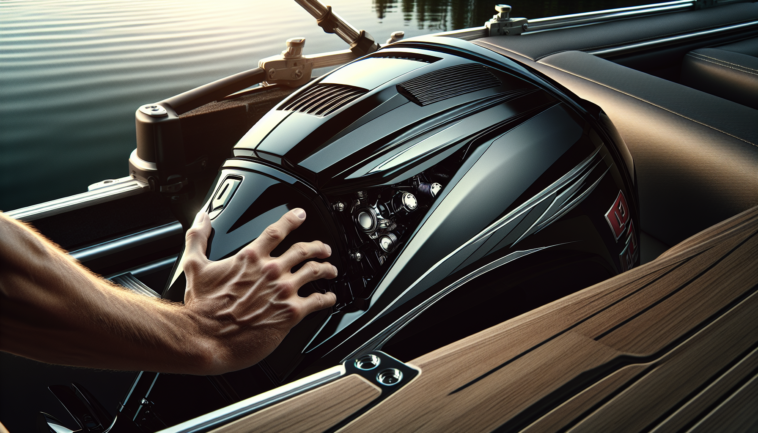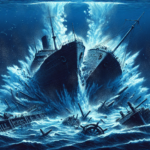If you’re wondering about the ideal engine size for a pontoon boat, you’ve come to the right place! Choosing the right engine for your pontoon boat is crucial to ensure a smooth and enjoyable ride on the water. Whether you’re planning a relaxing day of fishing or a fun-filled outing with friends and family, finding the perfect engine size will determine the boat’s performance and fuel efficiency. In this article, we’ll explore the factors to consider and provide some helpful tips to help you make an informed decision. So, let’s dive in and find out what size engine is recommended for a pontoon boat!

Factors to Consider
When choosing an engine for your pontoon boat, there are several important factors to consider. These factors will help determine the size and type of engine that will best suit your needs. The three main factors to consider are boat size, weight capacity, and intended use.
Boat Size
The size of your pontoon boat is an important consideration when selecting the right engine. Smaller boats will typically require smaller engines, while larger boats will require more powerful engines. It is important to choose an engine that is capable of providing enough power to propel your boat effectively and efficiently.
Weight Capacity
Another factor to consider when selecting an engine for your pontoon boat is the weight capacity. The weight capacity refers to the maximum weight that the boat can safely carry. It is important to choose an engine that can handle the weight of your boat, passengers, and any additional equipment that you may have on board.
Intended Use
The intended use of your pontoon boat will also play a role in determining the size and type of engine that is recommended. If you plan to use your boat for leisurely cruising and fishing, a smaller engine may be sufficient. However, if you plan to use your pontoon boat for water sports or towing activities, a more powerful engine may be necessary.
Engine Power Ratings
When it comes to engines, there are several power ratings to consider. These ratings include horsepower (HP), torque, and thrust. Each of these power ratings plays a role in the performance of your pontoon boat.
Horsepower (HP)
Horsepower (HP) refers to the amount of power that an engine can produce. The higher the horsepower rating, the more power the engine will have. Higher horsepower engines are generally better suited for larger boats or those that will be used for towing or water sports.
Torque
Torque is another important power rating to consider. Torque refers to the twisting force that an engine can generate. Higher torque engines are better suited for activities that require a lot of pulling power, such as towing or water skiing.
Thrust
Thrust is a power rating that is specific to electric motors. Electric motors provide thrust by propelling water with a spinning propeller. Higher thrust motors are better suited for larger boats or those that will be used for towing or water sports.
Types of Engines
There are several different types of engines that can be used on a pontoon boat. The most common types of engines include four-stroke engines, two-stroke engines, and electric motors. Each type of engine has its own advantages and considerations.
Four-stroke Engine
Four-stroke engines are the most commonly used engines on pontoon boats. These engines operate on a four-stroke cycle, which includes intake, compression, power, and exhaust strokes. Four-stroke engines are known for their reliability, fuel efficiency, and low emissions.
Two-stroke Engine
Two-stroke engines are another option for pontoon boat engines. These engines operate on a two-stroke cycle, which includes both the compression and power strokes in one revolution of the crankshaft. Two-stroke engines are generally more powerful and lighter than four-stroke engines but can be less fuel-efficient and produce more emissions.
Electric Motor
Electric motors are becoming increasingly popular for pontoon boats. These motors are powered by batteries and do not produce any emissions. Electric motors are quiet, low-maintenance, and offer instant torque. However, they have limited range and may not be suitable for long-distance cruising or towing activities.
Fuel Efficiency
Fuel efficiency is an important consideration when choosing an engine for your pontoon boat. Fuel efficiency refers to how much fuel the engine consumes to generate power. There are several factors that can affect fuel efficiency, including fuel consumption, fuel type, and fuel tank capacity.
Fuel Consumption
Fuel consumption refers to the rate at which an engine consumes fuel. Engines with higher fuel consumption will require more frequent refueling, which can impact your boating experience. It is important to choose an engine that has a fuel consumption rate that aligns with your boating habits and expectations.
Fuel Type
The type of fuel that your engine requires is another important consideration for fuel efficiency. Most pontoon boat engines are designed to run on gasoline, but some engines may be compatible with alternative fuels such as ethanol or propane. It is important to check the manufacturer’s recommendations for fuel type and ensure that the fuel is readily available in your area.
Fuel Tank Capacity
The fuel tank capacity of your pontoon boat will also impact fuel efficiency. A larger fuel tank capacity will allow for longer periods of operation without the need for refueling. However, larger fuel tanks may also add additional weight to your boat, which can impact performance and fuel efficiency.
Boat Speed and Performance
The speed and performance of your pontoon boat are important considerations when selecting an engine. Factors such as top speed, acceleration, and maneuverability can all impact your boating experience.
Top Speed
The top speed of your pontoon boat refers to the maximum speed that the boat can achieve. Higher horsepower engines will generally provide higher top speeds. However, it is important to consider your intended use and ensure that the top speed aligns with your boating needs and preferences.
Acceleration
Acceleration is another important factor to consider when evaluating the performance of your pontoon boat. Higher horsepower engines will generally provide faster acceleration, allowing you to quickly reach your desired speed. This can be particularly important for activities such as water sports, where quick acceleration is necessary.
Maneuverability
Maneuverability refers to how easily your pontoon boat can be controlled and navigated. Factors such as engine power, boat design, and weight distribution can all impact maneuverability. It is important to choose an engine that provides sufficient power for the type of maneuverability you desire, whether that be smooth cruising or agile handling.
Considerations for Towing
If you plan to use your pontoon boat for towing activities, there are additional considerations to keep in mind. Towing places additional strain on the engine and requires sufficient power and stability.
Pulling Capacity
The pulling capacity of your pontoon boat refers to the maximum weight that it can safely tow. It is important to choose an engine that has enough power to handle the weight of the towed object, whether it be a water skier, tube, or another boat. It is also important to consider the weight distribution and ensure that it is properly balanced for safe towing.
Weight Distribution
Proper weight distribution is crucial for safe and efficient towing. The weight of the towed object should be evenly distributed to avoid stability issues. It is important to ensure that your pontoon boat has the necessary towing capacity and that the weight is distributed correctly.
Towing Safety
When towing with your pontoon boat, it is important to prioritize safety. Ensure that you have the necessary safety equipment, such as tow ropes, flags, and life jackets, and that you are familiar with safe towing practices. It is also important to consider the impact that towing will have on your engine and fuel efficiency.

Budget and Cost Factors
Budget and cost are important considerations when selecting an engine for your pontoon boat. There are several cost factors to consider, including initial cost, maintenance cost, and fuel cost.
Initial Cost
The initial cost of the engine is an important consideration for many boaters. Engines can vary significantly in price, depending on factors such as brand, power rating, and features. It is important to set a budget and choose an engine that fits within your financial means.
Maintenance Cost
Maintenance cost is another important consideration when evaluating the overall cost of owning an engine. Regular maintenance, such as oil changes, spark plug replacements, and winterization, will be necessary to keep your engine running smoothly. It is important to consider the long-term maintenance requirements and associated costs when selecting an engine.
Fuel Cost
Fuel cost is an ongoing expense that should be factored into your overall budget. Consider the fuel consumption rate of the engine and the cost of fuel in your area. Engines that are more fuel-efficient may have a higher initial cost but can result in long-term savings on fuel expenses.
Noise and Vibration
Noise and vibration levels can greatly impact your boating experience. It is important to choose an engine that minimizes noise and vibrations to ensure a comfortable and enjoyable ride.
Engine Noise
Engine noise is something to consider when selecting an engine for your pontoon boat. Some engines are quieter than others, which can greatly enhance the overall boating experience. It is important to choose an engine that is known for low noise levels, particularly if you plan to spend a lot of time on the water or engage in activities that require conversation or relaxation.
Vibration Dampening
Engine vibrations can also impact your boating experience. Excessive vibrations can be uncomfortable and may affect your ability to maneuver and control the boat. It is important to choose an engine that has effective vibration dampening features to minimize the impact of vibrations on your boating experience.
Environmental Impact
Considering the environmental impact of your engine choice is becoming increasingly important for many boaters. There are several factors to consider when evaluating the environmental impact of an engine.
Emissions
Emissions refer to the pollutants that are released into the air as a result of engine combustion. Engines that produce lower emissions are generally considered more environmentally friendly. It is important to choose an engine that meets or exceeds the environmental regulations in your area.
Eco-friendly Options
There are several eco-friendly options available for pontoon boat engines. Some engines are designed to run on alternative fuels, such as ethanol or propane, which produce lower emissions compared to traditional gasoline engines. Electric motors are another eco-friendly option, as they produce zero emissions. It is important to weigh the environmental benefits against other considerations, such as power and range, when selecting an eco-friendly engine.
Manufacturer Recommendations
To ensure optimal performance and safety, it is always recommended to follow the guidelines provided by the pontoon boat manufacturer and the engine manufacturer.
Pontoon Boat Manufacturer Guidelines
Pontoon boat manufacturers often provide specific guidelines and recommendations for engine size, power, and type that are suitable for their boat models. These guidelines are based on extensive testing and engineering to ensure that the boat performs as intended and maximizes safety.
Engine Manufacturer Recommendations
Engine manufacturers also provide recommendations for their specific engine models. These recommendations take into account factors such as boat size, weight capacity, and intended use to help guide boat owners in selecting the right engine. It is important to consider both the pontoon boat manufacturer guidelines and the engine manufacturer recommendations to ensure compatibility and optimal performance.
In conclusion, choosing the right engine for your pontoon boat is a decision that should be made after carefully considering several factors. Boat size, weight capacity, and intended use are important considerations that will help determine the size and type of engine that is recommended. Power ratings such as horsepower, torque, and thrust play a role in the performance of your boat. Fuel efficiency, boat speed and performance, towing capacity, budget and cost factors, noise and vibration levels, environmental impact, and manufacturer recommendations are all important factors to consider when making your decision. By thoroughly evaluating each factor and considering your specific needs and preferences, you can choose an engine that will provide you with a safe, enjoyable, and efficient boating experience.






